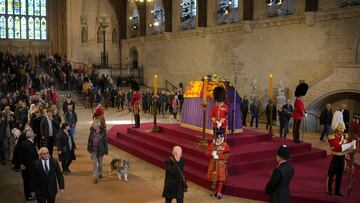How many people are expected to attend Queen Elizabeth II’s funeral?
More than 2,000 people were invited to Queen Elizabeth’s funeral. Who will make the trip?


The state funeral of Queen Elizabeth II may end up being one of the most historical events of the early twenty-first century. It earns this ranking not only because of the length of Queen Elizabeth’s rule but because of how the event is a crystal clear example of modernity rubbing up against what is left of a colonial, feudal, and archaic system of governance. The notion that some, because of their birth, are endowed with certain rights to rule over others runs counter to democratic ideals, the capitalist meritocratic imagination, as well as the right to self-determination invoked by decolonial movements which protested British rule during the 20th century.
Just like in the United Kingdom, the reaction to the Queen’s passing is mixed in former British colonies. The world is very different today than when Queen Elizabeth II rose to power in 1952, and interestingly enough, it is her death that brings such differences to light.
The legacy of Queen Elizabeth II as an active participant in British colonialism is a conversation worthy of attention but will not form part of the funeral events that are expected to attract over 2,000 high-profile guests. As a sign of respect, over five hundred foreign leaders will make their way to London for the Queen’s funeral. In addition to these guests, authors, spiritual leaders, celebrities, and other public figures will join mourners as the world says bids farewell to a major historical figure.
Commonwealth members: which leaders will attend?
Queen Elizabeth II finds adoring supporters and ardent opponents all over the world because, like any historical figure, her life cannot be cast in black or white. For some members of the Commonwealth, the death of the Queen has reinvigorated a national conversation over their future as a member and whether or not they will accept King Charles III as their new head of state - even if the position is only ceremonial. The Queen’s legacy will be informed by how the British crown adapts to this centuary and the challenges the world faces.
Only thirty-two of the fifty-six member Commonwealth have decided to send their highest political leader.
Another group of nations has opted to send other high-ranking members of the government or members of their own royal houses:
- Belize, Dame Froyla Tzalam, Governor-General of Belize
- Brunei, Hassanal Bolkiah, Sultan of Brunei
- Dominica, Joseph Isaac, Speaker of the House of Assembly of Dominica
- Grenada, Dame Cécile La Grenade, Governor-General of Grenada
- Guyana, Gail Teixeira, the Minister of Parliamentary Affairs and Governance
- Lesotho, Letsie III, King of Lesotho
- Malaysia, The Yang di-Pertuan Agong and Raja Permaisuri Agong of Malaysia
- Nigeria, Yemi Osinbajo, Vice President
- Saint Kitts and Nevis, Denzil Douglas, Minister of Foreign Affairs and former Prime Minister
- Saint Lucia, Errol Charles, acting Governor-General of Saint Lucia
- Saint Vincent and the Grenadines, Dame Susan Dougan, Governor-General of Saint Vincent and the Grenadines
- Sierra Leon, Fatima Bio, First Lady Fatima Bio
- Solomon Islands, Sir David Vunagi, Governor-General of Solomon Islands
- The Gambia, Hamat Bah, Minister of Tourism and Culture
- Tonga, Tupou VI, King of Tonga
Related stories
The only Commonwealth member nations that will not send a representative are Botswana, Eswatini, Kiribati, Mozambique, Rwanda, Togo, Uganda, Vanuatu, and Zambia. Justifications for their absences have not been provided.
Non-Commonwealth Heads of State and Leaders
A total of forty-one non-Commonwealth members will send their head of state or government to the funeral, including:
- Bajram Begaj, President of Albania, and First Lady Armanda Begaj
- Alexander Van der Bellen, President of Austria
- Aïmene Benabderrahmane, Prime Minister of Algeria
- Jair Bolsonaro, President of Brazil, and First Lady Michelle Bolsonaro
- Rumen Radev, President of Bulgaria
- Zoran Milanović, President of Croatia
- Petr Fiala, Prime Minister of the Czech Republic
- Mostafa Madbouly, Prime Minister of Egypt
- Alar Karis, President of Estonia, and First Lady Sirje Karis
- Sauli Niinistö, President of Finland, and First Lady Jenni Haukio
- Emmanuel Macron, President of France and Co-Prince of Andorra, and First Lady Brigitte Macron
- Salome Zourabichvili, President of Georgia
- Frank-Walter Steinmeier, President of Germany, and First Lady Elke Büdenbender
- Katerina Sakellaropoulou, President of Greece
- Katalin Novák, President of Hungary
- Guðni Th. Jóhannesson, President of Iceland, and First Lady Eliza Reid
- Michael D. Higgins, President of Ireland
- Micheál Martin, Taoiseach of Ireland
- Isaac Herzog, President of Israel, and First Lady Michal Herzog
- Sergio Mattarella, President of Italy, and de facto First Lady Laura Mattarella
- Yoon Suk-yeol, President of South Korea, and First Lady Kim Keon-hee
- Vjosa Osmani, President of Kosovo, and First Gentleman Prindon Sadriu
- Egils Levits, President of Latvia, and First Lady Andra Levite
- Najib Mikati, Prime Minister of Lebanon
- Gitanas Nausėda, President of Lithuania, and First Lady Diana Nausėdienė
- Maia Sandu, President of Moldova
- Luvsannamsrain Oyun-Erdene, Prime Minister of Mongolia
- Milo Đukanović, President of Montenegro
- Stevo Pendarovski, President of North Macedonia, and First Lady Elizabeta Gjorgievska
- Mohammad Shtayyeh, Prime Minister of Palestine
- Andrzej Duda, President of Poland, and First Lady Agata Kornhauser-Duda
- Marcelo Rebelo de Sousa, President of Portugal
- Klaus Iohannis, President of Romania
- Hassan Sheikh Mohamud, President of Somalia
- Oscar Mina and Paolo Rondelli, Captains Regent of San Marino
- Aleksandar Vučić, President of Serbia
- Zuzana Čaputová, President of Slovakia
- Borut Pahor, President of Slovenia
- Ignazio Cassis, President of Switzerland
- Joe Biden, President of the United States, and First Lady Jill Biden.